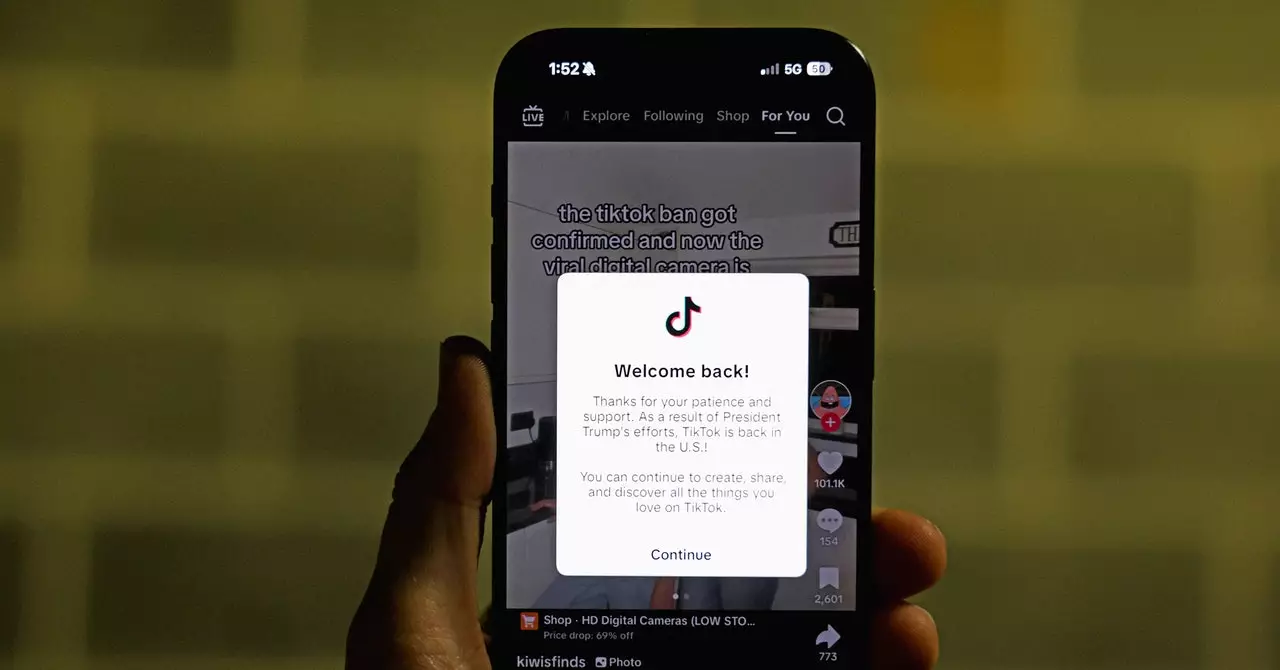The saga of TikTok’s ban and subsequent reinstatement on US app stores has been nothing short of dramatic. Following its removal from the Apple App Store and Google Play Store for nearly a month, the app has made a sudden return, stirring conversations about governmental influence, foreign relations, and consumer rights. Just weeks ago, TikTok faced an uncertain fate due to legal implications stemming from the Protecting Americans From Foreign Adversary Controlled Applications Act (PAFACA), which barred American tech companies from distributing applications owned by Chinese firm ByteDance. This act placed a blanket ban over a collection of apps, severely limiting consumer access and sparking concern about the monopolization of digital space.
The return of TikTok was initiated by an assurance from newly sworn-in U.S. Attorney General Pam Bondi. By writing to Apple and Google with guarantees that they would not face repercussions for hosting the platform, Bondi initiated a series of reactions that would eventually lead to TikTok’s relaunch. The timing of Bondi’s intervention, coming shortly after President Trump’s promise to delay any enforcement during his administration’s transitional phase, has raised questions about the intertwining nature of tech policy and political maneuvering in the face of public scrutiny.
The legislative backdrop of this situation is critically important. PAFACA, which prohibits the distribution of applications owned by foreign adversaries, presents a significant hurdle for not only TikTok but similar platforms owned by ByteDance. The implications of this law are broad-ranging, not only as a potential barrier for foreign-owned apps but also concerning the precedents it sets for digital marketplace dynamics in the US. With the federal government seemingly weighing the national security risks versus consumer access to popular applications, a complex paradox arises.
Despite the law now seemingly relaxed for TikTok, the ongoing tension over foreign ownership of digital platforms raises critical questions regarding data privacy and consumer security. Are users aware of these risks when they engage with platforms like TikTok? The reinstatement may provide immediate relief and restore normalcy in the short term, but the undercurrents of skepticism around data privacy and international relationships endures in the background. Ongoing debates over app ownership sway heavily on public sentiment and political pressure, showcasing how digital ecosystems remain vulnerable to external, often volatile, factors.
For millions of users, TikTok’s return means a restoration of not just an application, but a form of social interaction, creativity, and community engagement that has become integral to modern digital culture. However, this reinstatement also compels a closer look at the broader implications for users and competitors in the app marketplace. As TikTok regains its footing, other apps that faced a spike in usage during the ban may find themselves on less stable ground, yet benefiting from the temporary void left by a significant content creator platform.
Moreover, the circumstances of the ban and return hint at a delicate balancing act that app developers must undertake, particularly those with international ties. Alternate apps may gain temporary traction, but the challenge remains to maintain that momentum once TikTok regains its user base. Hence, while TikTok’s revival indicates a win for its fans, it casts a spotlight on the fragility of user loyalty in an environment dictated by political decisions and concerns over national security.
The future trajectory of TikTok and comparable applications remains an enigma fueled by ongoing geopolitical tensions and evolving public opinion. Negotiations surrounding potential sales or partnerships with American entities could threaten its operational integrity, forcing it to adapt or alter its strategies moving forward. President Trump’s proposed interests in sharing ownership highlight a strategy aimed at alleviating national security concerns, all while attempting to retain the app’s vibrancy that has captivated users.
With PAFACA still in place, it remains to be seen how the legal landscape will shift amid the constant tension between governmental regulation and the digital freedom consumers expect. TikTok’s remarkable comeback may ultimately serve as a case study for how emergent technologies navigate the fluid intersections of entertainment, power, and control. Each shift in policy will echo throughout the digital universe, shaping not just user experiences but also the very fabric of app development and consumer priorities. Balancing privacy concerns with the desire for global connectivity will be a pivotal challenge not only for TikTok but for the future of technology in an interconnected world.

